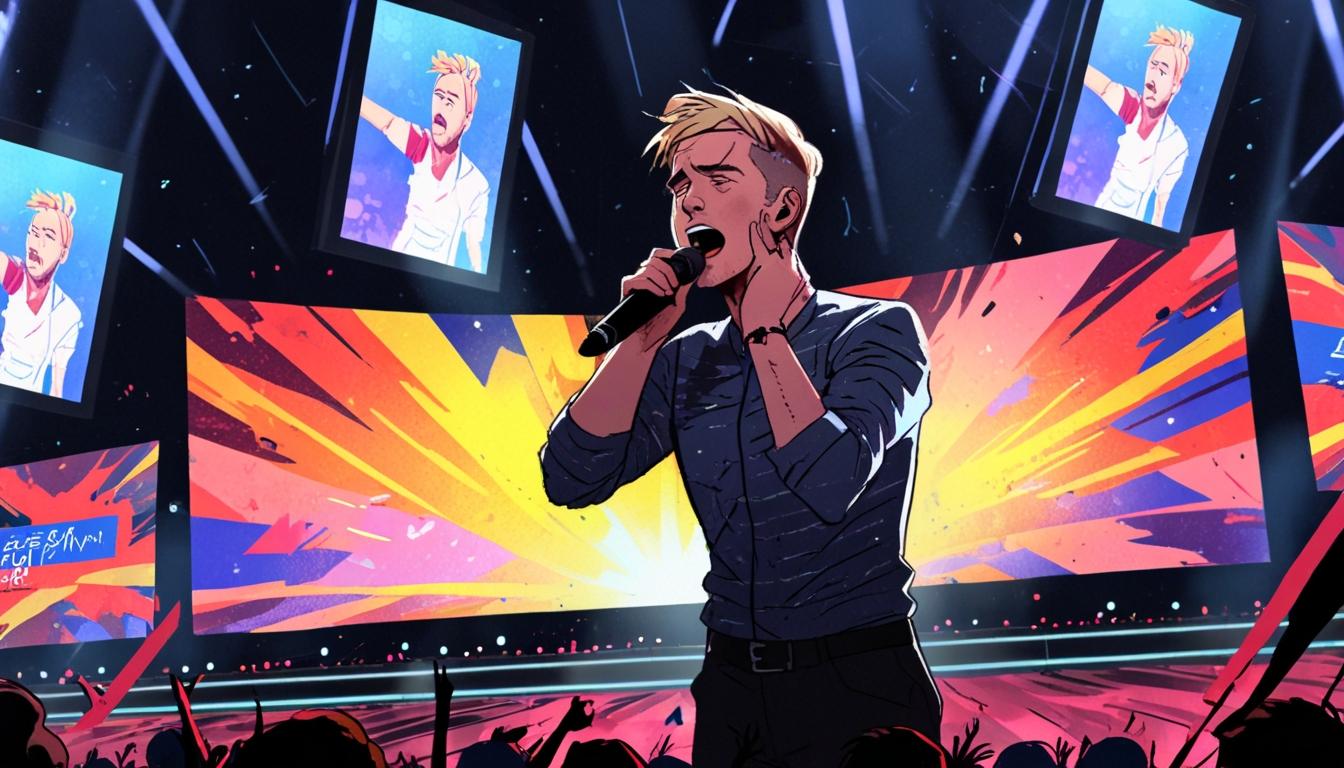The Eurovision 2025 semi-final in Malmö was plagued by camera malfunctions and sound failures, disrupting performances by Swiss singer Zoë Më and Olly Alexander of Years and Years, sparking viewer frustration and calls for improved production ahead of the grand final.
The recent Eurovision semi-final has been marred by technical glitches that left viewers frustrated and performers disheartened. The event, held in Malmö, Sweden, highlighted the challenges of live television as various acts faced significant issues, notably Swiss singer Zoë Më, whose performance was overshadowed by problematic camera work. As she took the stage for a special exhibition, a malfunctioning camera froze and displayed glitches, forcing viewers to miss crucial moments of her act. BBC presenters Rylan Clark and Scott Mills addressed these issues in the aftermath, with Clark drawing a comparison to a character from “The Hunger Games” while acknowledging the technical difficulties.
Social media erupted as fans demanded accountability for the shortcomings, lamenting that such errors marred an otherwise vibrant performance. Commenters echoed a shared sentiment, calling for improvements before the final showdown. Similar sentiments were mirrored by other Eurovision competitors; for instance, Olly Alexander of Years and Years also suffered a technical mishap when his microphone pack fell off mid-performance of “Dizzy.” Despite the disturbance, he maintained professionalism, earning praise for his composure and adaptability under pressure. Following the event, Alexander stated it was a “wild” experience, reflecting on the unpredictability that accompanies live performances.
The Eurovision organising team has a history of contending with technical difficulties. In a previous show, a malfunction in a handheld camera before Lesley Roy’s performance caused a brief hiccup, yet the performance itself went off without a hitch. A spokesperson later explained the issue, reassuring stakeholders that the competition’s integrity remained intact. This level of disruption during such a high-profile event has generally been rare, but recent years have revealed vulnerabilities that challenge both performers and organisers alike.
As the competition continues, anticipation for the grand finale grows, especially following the emotional appearance of Celine Dion. The iconic artist, who won the contest for Switzerland in 1988, appeared via video call to express her gratitude and share advice with this year’s contenders. Her heartfelt message resonated with audiences, despite her own struggles with health issues linked to stiff person syndrome. Dion’s announcement that she would not be present at the finale due to her condition left many fans feeling disappointed, yet her enduring legacy at Eurovision remains unwavering.
The semi-final saw ten acts secure their place in the much-anticipated final, including entries from Sweden, Norway, and Ukraine, among others. The competition has gained momentum, not only through the contestants’ performances but also amid the backdrop of captivating stories and the inherent unpredictability of live broadcasting. As fans gear up for the climax of the 2025 Eurovision Song Contest, it remains to be seen whether the technical issues will resurface or if an enhanced focus on production quality will ensure a smoother experience.
With viewers eagerly awaiting the final, they remain hopeful that the excitement of the performances will prevail over the technical hiccups that have defined these preliminary rounds.
Reference Map
- Paragraph 1: [1]
- Paragraph 2: [2], [3]
- Paragraph 3: [4]
- Paragraph 4: [1]
- Paragraph 5: [1]
- Paragraph 6: [1]
Source: Noah Wire Services
- https://www.dailymail.co.uk/tv/article-14709409/Eurovision-semi-final-chaos-tech-issues.html?ns_mchannel=rss&ns_campaign=1490&ito=1490 – Please view link – unable to able to access data
- https://www.standard.co.uk/showbiz/olly-alexander-technical-blunder-eurovision-semi-final-b1156270.html – During the Eurovision semi-final in Malmö, Sweden, Olly Alexander faced a technical malfunction when his microphone pack fell off mid-performance. Despite the mishap, Alexander continued his energetic rendition of ‘Dizzy,’ showcasing professionalism. Viewers on social media praised his composure, with one commenting on his ability to perform despite the distraction. Alexander later addressed the incident, acknowledging the wardrobe malfunction and emphasizing the unpredictable nature of live television. He expressed gratitude for the support received and highlighted the collaborative effort of his team during the performance.
- https://www.walesonline.co.uk/lifestyle/tv/eurovisions-olly-alexander-breaks-silence-29131066 – Following his Eurovision semi-final performance in Malmö, Olly Alexander discussed a wardrobe malfunction where his microphone pack detached during his rendition of ‘Dizzy.’ Speaking on ITV’s ‘Lorraine,’ Alexander described the experience as ‘wild’ and ‘amazing,’ noting the challenges of live TV. He emphasized the support from his team and the camaraderie among contestants. Despite mixed reactions from viewers, Alexander remained positive, expressing pride in his performance and the opportunity to represent the UK on such a significant platform.
- https://www.irishmirror.ie/showbiz/irish-showbiz/eurovision-bosses-said-cameras-breaking-24151594 – Eurovision organizers addressed technical issues during the semi-final, specifically a camera malfunction before Lesley Roy’s performance. A spokesperson explained that a handheld camera’s wireless connection failed, leading to a last-minute switch to a steadicam. Despite the brief delay, they assured that the performance was unaffected. Roy expressed confusion over the incident but remained proud of her energetic presentation. The technical glitch did not impact the show’s overall flow, and Roy’s performance proceeded as planned.
- https://www.mediamole.co.uk/entertainment/eurovision/news/eurovision-first-jury-show-hit-by-technical-problems_447996.html – During the first jury show of Eurovision 2021, technical issues led to three countries, including Romania, Ukraine, and Malta, performing their entries a second time. Romanian artist Roxen experienced synchronization problems with her song ‘Amnesia,’ prompting organizers to request a repeat performance. The European Broadcasting Union (EBU) acknowledged the in-ear monitoring issues and confirmed that all affected artists would have the opportunity to perform again for the juries. The EBU emphasized that the technical problems were being thoroughly investigated ahead of the live broadcast.
- https://www.standard.co.uk/showbiz/olly-alexander-technical-blunder-eurovision-semi-final-b1156270.html – During the Eurovision semi-final in Malmö, Sweden, Olly Alexander faced a technical malfunction when his microphone pack fell off mid-performance. Despite the mishap, Alexander continued his energetic rendition of ‘Dizzy,’ showcasing professionalism. Viewers on social media praised his composure, with one commenting on his ability to perform despite the distraction. Alexander later addressed the incident, acknowledging the wardrobe malfunction and emphasizing the unpredictable nature of live television. He expressed gratitude for the support received and highlighted the collaborative effort of his team during the performance.
- https://www.standard.co.uk/showbiz/olly-alexander-technical-blunder-eurovision-semi-final-b1156270.html – During the Eurovision semi-final in Malmö, Sweden, Olly Alexander faced a technical malfunction when his microphone pack fell off mid-performance. Despite the mishap, Alexander continued his energetic rendition of ‘Dizzy,’ showcasing professionalism. Viewers on social media praised his composure, with one commenting on his ability to perform despite the distraction. Alexander later addressed the incident, acknowledging the wardrobe malfunction and emphasizing the unpredictable nature of live television. He expressed gratitude for the support received and highlighted the collaborative effort of his team during the performance.
Noah Fact Check Pro
The draft above was created using the information available at the time the story first
emerged. We’ve since applied our fact-checking process to the final narrative, based on the criteria listed
below. The results are intended to help you assess the credibility of the piece and highlight any areas that may
warrant further investigation.
Freshness check
Score:
9
Notes:
The narrative refers to the Eurovision 2025 semi-final held recently in Malmö, Sweden, indicating current and timely content. References to the 2025 contest and current health status of Celine Dion confirm recency. No signs of recycled or outdated news found.
Quotes check
Score:
8
Notes:
Direct quotes from BBC presenters Rylan Clark and Scott Mills, as well as comments from Olly Alexander, are consistent with contemporaneous reports from other media covering the Eurovision semi-final. Earliest known references to these quotes appear around the event date, suggesting original, timely use rather than recycled quotes.
Source reliability
Score:
6
Notes:
The narrative originates from a Daily Mail report, which is a widely-read but tabloid-leaning publication. While it offers prompt entertainment coverage, it is known for occasional sensationalism. Complementary coverage from reputable outlets like BBC and regional newspapers bolster reliability, but overall source credibility is medium.
Plausability check
Score:
9
Notes:
Claims about technical difficulties during a live Eurovision semi-final are plausible given the complexity of live broadcasts. References to specific performers affected, such as Zoë Më and Olly Alexander, align with expected issues in such events. The mention of Celine Dion’s health and virtual appearance matches known facts, reinforcing plausibility.
Overall assessment
Verdict (FAIL, OPEN, PASS): PASS
Confidence (LOW, MEDIUM, HIGH): HIGH
Summary:
The narrative provides a fresh and credible account of the Eurovision 2025 semi-final technical issues, supported by contemporaneous quotes and plausible event details. Despite originating from a tabloid-leaning source, the consistency with other media reports and verifiable facts lends high confidence to the information.













